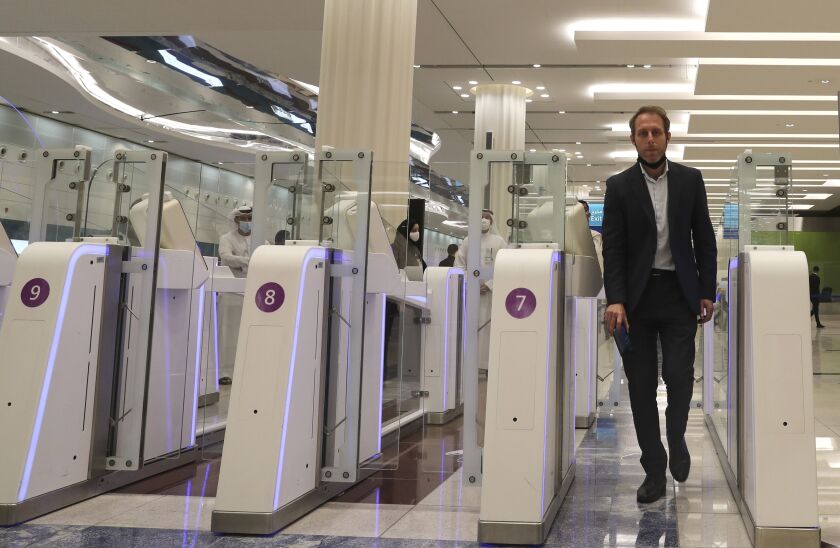DUBAI, United Arab Emirates — Dubai’s airport, the world’s busiest for international travel, already can feel surreal, with its cavernous duty-free stores, artificial palm trees, water cascades and near-Arctic levels of air-conditioning.
Now, the key east-west transit hub is rolling out another addition from the realm of science fiction — an iris-scanner to verify each traveler’s identity, eliminating the need for any human interaction when entering or leaving the country.
It’s the latest artificial intelligence program the United Arab Emirates has launched amid the surging coronavirus pandemic — contact-less technology the government promotes as helping to stem the spread of the virus.
But the efforts also have renewed questions about mass surveillance in the federation of seven sheikhdoms, which experts believe has among the highest per-capita concentrations of surveillance cameras in the world.
Dubai’s airport started offering the program to all passengers last month.
Travelers step up to an iris scanner after checking in, give it a good look and breeze through passport control in seconds.
No longer needed here: paper tickets or unwieldy phone apps.
In recent years, airports across the world have accelerated their use of facial recognition technology to move passengers more quickly to their flights.
But Dubai’s iris scan is a step up from the more commonplace automated gates seen elsewhere, authorities there say, connecting the iris data to the country’s facial recognition databases so passengers need no identifying documents or boarding pass.
They say the unusual partnership between long-haul carrier Emirates, owned by a Dubai sovereign wealth fund, and the Dubai immigration office integrates the data and carries travelers from check-in to boarding in one fell swoop.
“The future is coming,” said Major Gen. Obaid Mehayer Bin Suroor, deputy director of the General Directorate of Residency and Foreign Affairs. “Now, all the procedures have become ‘smart’ — around five to six seconds.”
But, like all facial recognition technology, the program fuels fears of vanishing privacy in a country that has faced international criticism for targeting journalists and human rights activists.
According to Emirates’ biometric privacy statement, the airline links passengers’ faces with other personally identifying data, including passport and flight information, retaining it for “as long as it is reasonably necessary for the purposes for which it was collected.”
The agreement offered few details about how the data will be used and stored beyond saying that, although the company didn’t make copies of passengers’ faces, other personal data “can be processed in other Emirates’ systems.”
Bin Suroor said that Dubai’s immigration office “completely protects” passengers’ personal data so that “no third party can see it.”
Without more information about how data will be used or stored, though, biometric technology raises the possibility of misuse, experts say.
“Any kind of surveillance technology raises red flags regardless of what kind of country it’s in,” said Jonathan Frankle, a doctoral student in artificial intelligence at the Massachusetts Institute of Technology. ”But, in a democratic country, if the surveillance technology is used transparently, at least there’s an opportunity to have a public conversation about it.”
Iris scans require people to stare into a camera. They have become more widespread worldwide in recent years as questions have arisen over the accuracy of facial recognition technology. Iris biometrics are considered more reliable than surveillance cameras that scan people’s faces from a distance without their knowledge or consent.
Despite concerns about overzealous surveillance in the United Arab Emirates, the country’s vast facial recognition network appears to be expanding. Last month, Prime Minister Sheikh Mohammed bin Rashid Al Maktoum, who also is Dubai’s ruler, announced without giving any details that the country would begin trials of new facial recognition technology to cut down on paperwork in “some private sector services.”
During the pandemic, the skyscraper-studded city of Dubai has advanced an array of technological tools to fight the virus in malls and on streets, including disinfectant foggers, thermal cameras and face scans that check for masks and take temperatures.
The programs use cameras that can record and upload people’s data, potentially feeding the information into the city-state’s wider biometric databases.






